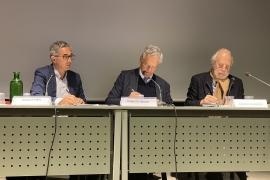
Jacques Fredj, Roberto Jarach and Giorgio Sacerdoti sign the agreement
On Monday 13th January an important meeting for the international memory of the Holocaust was held at the Shoah Memorial in Milan: the official ceremony that seals, with the signing of an agreement, the partnership between the Shoah Memorials of Milan and Paris and the CDEC Foundation (Foundation Jewish Contemporary Documentation Center). This commonality of purpose will be based on three main elements: the sharing of archives and the exchange of documents, the training of teachers and operators and a common cultural and scientific programming. The signing of the agreement was accompanied by speeches by the Director of the Memorial de la Shoah of Paris, Jacques Fredj, the President of the Shoah Memorial in Milan, Roberto Jarach, and the President of the CDEC Foundation, Giorgio Sacerdoti.
President Jarach opened the discussion by emphasizing the educational and non-vindictive memory divulged through the visits to the Milan Memorial and the need, in a delicate historical moment, to give formal contents useful for teaching that will be greatly enriched by this collaboration - which actually already existed for many years but which is now made official. The Memorial, he adds, will host the great Library of the CDEC.
Jacques Fredj, after having expressed the importance of meeting in an authentic place like Binario 21, spoke about the two souls of the activity born in France already during the Second World War as Centre de documentation juive contemporaine, then joined by the Memorial: historical research and memory work. The French archive has about 40 million documents and an enormous number of photographs, fundamental for a very detailed historical picture that is the basis for the construction of the educational activity of the Memorial, which focuses not only on the Shoah but also on other recognized genocides. The training of teachers, says Fredj, is the other fundamental element of the Memorial's work: "teachers must be given the tools to react within the classroom when intricate questions or distortions are raised". Also significant was the gift brought by Fredj: a collection of fundamental historical documents on the persecution of Jews in France, including the first anti-Semitic text of the Vichy regime, which graphologists attributed to General Pétain. "A truly precious collection", declared the historian Liliana Picciotto, "which we could also compose in Italy, because in Western Europe the mechanisms of genocide were similar”.
Sacerdoti pointed out that the work of the Center for Contemporary Jewish Documentation also began immediately after the end of the war, probably under impulse of the French one. "The two Centers have always collaborated, but today's one I hope will be a first step to be even more effective in our joint work”.
The ceremony then continued with another contribution, that of Professor Antonella Salomoni from the University of Calabria, a precious reconstruction - with a particular look at what happened in Ukraine - of how the signs of the Jewish presence, cemeteries, synagogues, houses, were destroyed and desecrated in the silence of the whole of Europe, even after the War. Salomoni quoted in this regard The Ukraine without Jews, an essay by Vasilij Grossman, a story of the Jewish past that has disappeared from the Country.
Following the round table moderated by Daniela Dana Tedeschi, vice-president of the Children of the Shoah Association, which was attended by the president of the Memorial, Milena Santerini, Professor of General Pedagogy at the Catholic University of the Sacred Heart of Milan and vice-president of the Shoah Memorial, and Gadi Luzzato Voghera, director of CDEC.
"The problems of the transmission of the memory of the Shoah today are two opposite ones", Santerini declared, "to make the Holocaust only a narrative of events unrelated to the teaching of human rights and the fight against racism and intolerance, and, on the contrary, to read it only with the eyes of the present, in function perhaps of a specific cause that today appears important, losing the singularity of the Holocaust, risking instrumentalizing or trivializing it". "It is not possible", she continues, "to teach the history of the Holocaust without regard to anti-Semitism and the racist ideology which permeated the national socialist regime. The memory of the Shoah is today the clearest lesson against all forms of prejudice and hatred”.
"After reconstruction and reconciliation came the need to educate", Director Fredj intervened. At the Memorial, paths were created for students with different characteristics according to their age, and everything is dotted with historical data. It was conceived without the will to educate through the horror of the worst images - as was the tendency for many years among those who wanted to explain the Shoah -, trying to stimulate thought and not emotion.
"We live in a society where everything is compared, why ban the comparison of the Holocaust, especially when we want to educate?", he added, speaking of the widespread risk, much felt by the Memorial, of trivialization and distortion of the history of the Jewish genocide. "Comparing it with other genocides allows us to show the commonalities and differences. Instead of saying that the history of the Holocaust is not comparable, analyzing it together with the other crimes its specificities will immediately emerge in a natural and pedagogical way. It is also a way to show that the Jews have not won the palmarès of suffering, and finally to build a real prevention of genocides, which must be inserted in a historical perspective to understand the mechanisms". Despite this, however, Fredj specifies, the teaching of the Holocaust is unfortunately not the antidote against evil, because even the students who visit the Memorial are not necessarily committed to improving their own behavior with respect to the other, in everyday life.
The director of CDEC Gadi Luzzato Voghera closed the evening with a reflection that opens the way to a new and growing commitment. After 20 years of Holocaust Remembrance Day there are still distortions of the facts and peaks of anti-Semitism in this period. "What didn't work?”
The richness of historical memory and studies on the Holocaust is an invaluable resource for identifying and investigating the mechanisms of evil in the world, which are repeated in different scenes in similar ways, and which, if recognized, can be prevented or countered in time to avoid new tragedies. The comparison between the genocides of History then helps us to identify the germs of the enemy's culture, which in the case of the Shoah have been analyzed deep down by illustrious minds. It is not enough, therefore, as Vice-President Santerini said, "to stop at the mere narrative", it is necessary to identify methods and instruments which stimulate a constructive and evolving reflection, as societies evolve. What can they be?
As Gariwo we thought of a way to help make memory accessible without trivializing it, that is to educate through the telling of the stories of the Righteous, together with the context in which they acted. They are those who during the darkest moments did not bend to common thought but took a different path, which always exists exactly like evil. People will continue to make mistakes and to be selfish, but those who know the Righteous may have an extra awareness: everyone has a space of responsibility in which to be the guardian of human dignity.
The Righteous, therefore, do not rise to absolute goodness, but celebrate dialogue and the personal capacity for choice of each one, against indifference. Their human imperfection teaches us that it is not enough to condemn the dangerous or pretentious thinking of those who incur in the blaming of the other or the fascination of strong power, we must respond by proposing an alternative to evil, which finds its essence in the good deeds of Righteous men.


